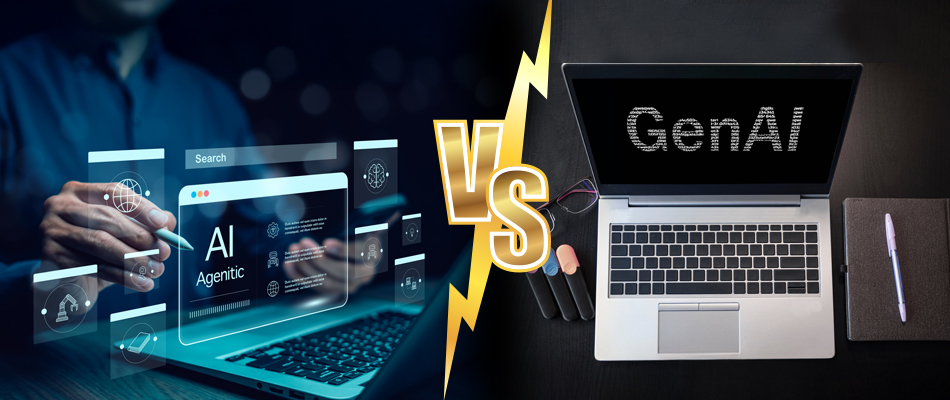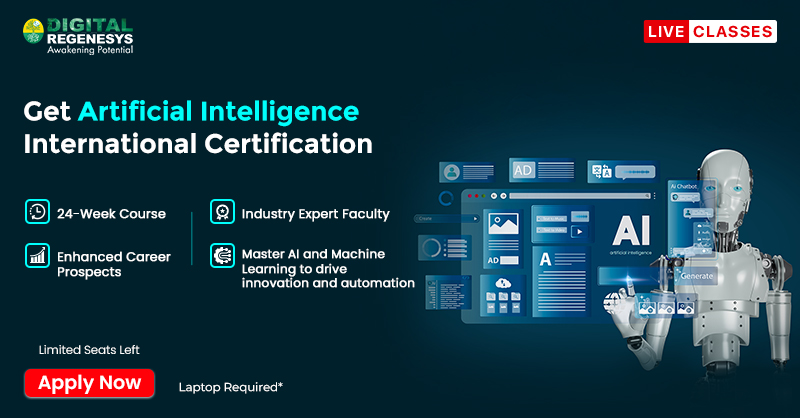Agentic AI vs Gen AI – Which One is Better?

Artificial Intelligence has moved far beyond basic automation, and two approaches now dominate conversations: Agentic AI and Generative AI (Gen AI). Both are reshaping industries in unique ways.
One is designed to make decisions and act with purpose, while the other is focused on creating new content across text, images, and more.
In this article, we will compare Agentic AI and Gen AI by examining how they work, where they are applied, their strengths and limitations, and which option is more suitable for different goals.
This will provide readers with practical insight into their differences and help determine which AI type offers greater value in specific contexts.
Key Differences Between Agentic AI and Gen AI
Agentic AI and Gen AI differ in their objectives, mechanisms, and outputs. Agentic AI aims to make decisions, take actions, and achieve specific goals, whereas Gen AI creates novel content without necessarily pursuing objectives.
Therefore, recognising these differences helps organisations and individuals choose the right AI tool for their needs. Each AI type has distinct strengths that make it better suited for specific environments, tasks, and operational challenges.
Comparison of Key Differences:
|
Aspect |
Agentic AI |
Gen AI |
|
Objective |
Goal-oriented and task-focused |
Content-oriented and creative |
|
Decision-Making |
Autonomous, adapts to real-time input |
Generates outputs from patterns in data |
|
Autonomy |
Adjusts to changing environments |
Limited by the training dataset |
|
Use Cases |
Operations, logistics, healthcare, finance |
Content creation, media, design, marketing |
|
Learning |
Learns from interactions and feedback |
Learns from large datasets |
|
Performance |
Improve task Efficiency |
Improves creativity and realism |
Read more – How to Start Studying Artificial Intelligence?

How Agentic AI Works vs Gen AI?
Agentic AI combines learning, planning, and decision-making algorithms to enable autonomous action. Gen AI utilises models such as GPT or diffusion networks to generate content based on patterns it has observed.
Therefore, understanding their operational mechanisms highlights where each AI excels. By analysing workflows, both AI types can be applied in combination to maximise productivity and creativity in complex systems.
Operational Mechanisms:
- Agentic AI: Uses machine learning, reinforcement learning, planning algorithms, knowledge representation, and sensor integration to act independently.
- Gen AI: Uses deep learning, neural networks, transformers, generative models, and extensive datasets to generate text, images, or videos.
- Focus: Agentic AI is focused on deciding actions and adapting during execution. Gen AI is focused on producing realistic, contextually aligned outputs during training and generation.
- Evaluation: Agentic AI measures success by goal achievement, while Gen AI measures fidelity, realism, and creativity in generated outputs.
What are the Industry Applications of Agentic AI vs Gen AI?
Both types of AI are applied across various industries, but their use cases differ significantly. Agentic AI is utilised for tasks that require autonomy, decision-making, and operational control. Gen AI is employed in areas that require content generation, creativity, and simulation.
Therefore, understanding applications helps determine which AI is better for a given scenario. Organisations are increasingly integrating these AI models to automate operations and efficiently accelerate content production.
Applications in Industries:
|
Industry/Domain |
Agentic AI Example |
Gen AI Example |
|
Transport |
Autonomous vehicles are making navigation decisions |
Generating synthetic driving simulations |
|
Healthcare |
Suggesting treatment plans and monitoring data |
Generating medical imaging or patient reports |
|
Finance |
Providing investment insights autonomously |
Producing automated reports and forecasts |
|
Customer Support |
Resolving queries independently |
Generating natural responses for chatbots |
|
Industrial Automation |
Optimising production and resource allocation |
Designing product prototypes through AI tools |
Discover information on Why Lifelong Learning is Crucial in the Artificial Intelligence Course Landscape.
What are the Advantages of Agentic AI and Gen AI?
Each AI type offers unique advantages depending on the application context. Agentic AI enhances operational efficiency and autonomous decision-making. Gen AI enhances creativity, increases content volume, and facilitates the generation of ideas.
Therefore, evaluating advantages is key to selecting a suitable AI model. Understanding these advantages helps professionals align AI implementation with organisational goals and workflow improvement strategies.
Advantages Overview:
- Agentic AI Benefits: Autonomy, scalability, adaptability, improved decision-making, and efficiency in operations.
- Gen AI Benefits: Rapid content generation, realistic and creative outputs, versatility across media, and support for human creativity.
- Shared Value: Both improve performance, reduce manual effort, and enhance productivity, though in different ways.
What are the Challenges of Agentic AI and Gen AI?
Both types of AI face challenges that affect implementation and reliability. Agentic AI has complexity, ethical, and operational issues. Gen AI has biases, data dependencies, and issues with content authenticity.
Therefore, understanding these challenges is essential for safe and effective deployment. Organisations must address these issues to ensure AI applications are reliable, ethical, and align with regulatory standards.
Comparison of Challenges:
|
Challenge Area |
Agentic AI |
Gen AI |
|
Technical Complexity |
High due to decision-making and autonomy |
High due to large-scale model training |
|
Ethics |
Risk of unintended autonomous actions |
Bias and misinformation in generated content |
|
Transparency |
Difficult to explain reasoning processes |
Outputs may lack explainability |
|
Dependence |
Needs continuous data and updates |
Relies heavily on training data quality |
|
Legal/Regulatory |
Compliance with safety and autonomy standards |
Intellectual property and copyright concerns |
Get insights on Why Study Artificial Intelligence?
Which AI is Better?
Determining which AI is better depends on the task and objectives. Agentic AI is superior for autonomous operations and decision-making in uncertain environments. In comparison, Gen AI excels in creative, generative, and simulation tasks.
Therefore, choosing the right AI requires evaluating goals, data availability, and operational requirements. Often, a hybrid approach can combine the strengths of both to achieve enhanced results in complex workflows.
Selection Criteria:
- Task type: Decision-making vs creative generation.
- Context: Real-time autonomous operations vs offline content creation.
- Resources: Computing power and data availability.
- Oversight: Required level of human monitoring.
- Outcome: Efficiency vs originality.
- Scale: Suitability for large or small operations.
Conclusion
Agentic AI and Gen AI represent distinct approaches to artificial intelligence, each with unique strengths and limitations. For learners and professionals aiming to understand and work with these AI types, the Digital Regenesys Artificial Intelligence Certificate Course offers structured knowledge and practical insights.
The course covers advanced AI methods, including Agentic and Generative AI, helping learners understand how to select and implement the right AI solution for specific scenarios and organisational needs.
Visit Digital Regenesys to explore the courses and learn more about Agentic AI and Gen AI.
Last Updated: 30 September 2025
